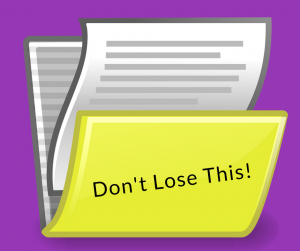Estate planning requires us to confront many challenging issues. For some, the thought of facing…
Paper – Should You Keep it? Can You Find It?
 Paper! We are besieged by bills, junk mail, school notices, insurance policies, magazines, catalogs, invitations, correspondence, warranties, receipts and bank statements. Our lives, work, home and families can require us to deal with enormous amounts of paper. It can very easily get out of hand when it’s not clear what papers to keep, where to put them and how long to keep them.
Paper! We are besieged by bills, junk mail, school notices, insurance policies, magazines, catalogs, invitations, correspondence, warranties, receipts and bank statements. Our lives, work, home and families can require us to deal with enormous amounts of paper. It can very easily get out of hand when it’s not clear what papers to keep, where to put them and how long to keep them.
Going paperless is not the solution for everyone; nor for every type of paper coming into our homes. Fortunately, there are simple guidelines that make managing paper much less overwhelming. Taking the time to determine what type of paperwork you are keeping and where it should live is the first step.
Learn to file your reference papers
For most of us, the papers that require a dedicated space are reference documents. These documents are best for filing, so you can retrieve them efficiently. Some papers you will need to access often and others won’t be looked at for years; but when you need them you will want to be able to put your hands on them quickly. This does not mean you will need a filing cabinet. Depending on your space configuration and personal preference, there are many options to hold files.
Sort your reference documents into categories such as legal, tax records, insurance policies for property, life and auto. Label these files with titles that are meaningful to you. If you are looking for the insurance policy for your car, would it be found under Auto or Insurance? Don’t forget to include often overlooked categories in your filing, such as receipts for large purchases, warranties and manuals.
Where to keep those critically important documents
We all have some papers that would be difficult or expensive to replace. We rarely need to look at these important documents but we usually need to hold onto them for a long time. The ideal location for MOST of these documents is a safe deposit box or fire-rated safe. A safe deposit box is highly secure; a home safe is more convenient and can be accessed twenty-four hours a day. It is essential that someone you trust is aware of the contents and has access to your safe deposit box or home safe, so they can retrieve necessary documents if you’re unable to do so. Some of these critically important documents include:
-
marriage / death certificate
-
Divorce and separation agreements
-
Adoption and custody agreements
-
Settlement agreements
-
Citizenship papers
-
Military service records
-
Pension papers
-
Diplomas
-
Social security card
-
Will original (signed)
-
Property deeds and settlement papers
-
Motor vehicles title and bill of sale
-
Proof of purchase for stocks
-
Mutual funds and other investments
-
Appraisals
-
Inventory of household
-
Records of capital improvements
-
List of insurance policies
-
Savings bonds
Note: There are certain documents that may seem like they belong in the safe deposit box; actually, the original should be held by the person you have assigned as the agent in these documents. These include your power of attorney, health care proxy, living will and funeral instructions.
The safest means of keeping your will is to file it with the Probate Court for the county in which you live. Your signed original will could also be stored in your safe deposit box or with your attorney. Be sure others are aware of your arrangements.
Taxes
The general assumption for taxes is seven years. BUT… if the government can prove fraud, they can audit you as far back as they wish. In the event of an audit, it is your responsibility to have all of the documentation that was used in preparation of your returns. Check with your CPA or the IRS to find out what documents are applicable to your situation and how long you need to keep them.
Do not file your action items
Anything that will need your attention shortly should be held in an easy to access location. A location in close proximity to where the mail enters the house could be convenient. Use a letter tray on a desk, a basket on your kitchen counter or a drawer as an in-box.
Be diligent about putting all paper that requires action here. Bills to pay, correspondence to write, dates that need to be added to your schedule, invitations that need response. Then act on this paper in a timely fashion. Developing these habits will take some time, so be patient. If after working with your in-box, you generate paper that needs to be saved for reference, file it immediately. This area can easily get out of control, so be strict about what gets saved here. Be careful not to use this area as a holding station for papers you haven’t given a home to.
Learn to let go!
A good part of any pile of paper can usually be thrown away or recycled. Ask yourself why you are keeping something. Could you replace it if you needed to? Is the information current? Could you get the same information somewhere else? A lot of information is available on the internet. Often schools, bookstores and civic and community organizations post schedules and other information on their web sites. Most catalogs are available on-line.
It’s important to purge your files regularly. As with all organizing, implementing routines and maintenance for paper will help keep the piles manageable. Many people hold onto years of utility and credit card bills, bank statements, receipts and cancelled checks. More often than not, this is completely unnecessary. Learn what you need to keep and for how long. When you no longer need something in a file – toss it!
Shred any paper with personal or financial information on it.
Those other things…
Although it is best to have most of your reference materials in one place, you may find that a different method for some other types of paper will work better. For example, designate a specific spot, maybe a nice box, for memorabilia to be held until you can organize it further. This can include photos, announcements, birthday cards, children’s art work, and letters. Resist the urge to keep everything, only hold onto those items with the most meaning and importance for you.
We often have difficulty with the last few papers in the pile because we are avoiding the decisions or the actions they require. Once you determine why you keeping something, it will be easier to decide where it should go and to locate it when you need it.
How would it feel to take control of all the paper in your life?
End the expense and frustration of lost papers and bring order and control back to your life. Making peace with the flow of paper through your home will provide you a tremendous sense of accomplishment. I can work with you to create a system that allows you to easily find what you need, when you need it!



